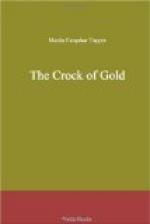As to farmer Floyd, he made a great stir about his boy being about to marry a felon’s daughter; and the affectionate mother, with many elaborate protestations, had “vowed to Master Jonathan, that she would rather lay him out with her own hands, and a penny on each eye, than see a Floyd disgrace himself in that ’ere manner.”
And uncles, aunts, and cousins, most disinterestedly exhorted that the obstinate youth be disinherited—“Ay, Mr. Floyd, I wish your son was a high-minded man like his father; but there’s a difference, Mr. Floyd; I wish he had your true blue yeoman’s honour, and the spirit that becomes his father’s son: if the lad was mine, I’d cut him off with a shilling, to buy a halter for his drab of a wife. Dang it, Mrs. Floyd, it’ll never do to see so queer a Mrs. Jonathan Junior, a standing in your tidy shoes beside this kitchen dresser.”
These estimable counsels were, I grieve to say, of too flattering a nature to displease, and of too lucrative a quality not to be continually repeated; until, really, Jonathan was threatened with beggary and the paternal malediction, if he would persist in his disreputable attachment.
Nevertheless, Jonathan clung to the right like a hero.
“Granting poor Acton is the wretch you think—but I do not believe one word of it—does his crime make his daughter wicked too? No; she is an angel, a pure and blessed creature, far too good for such a one as I. And happy is the man that has gained her love; he should not give her up were she thrice a felon’s daughter. My father and mother,” Jonathan went on to say, “never found a fault in her till now. Who was more welcome on the hill than pretty Grace? who would oftenest come to nurse some sickly lamb, but gentle Grace? who was wont, from her childhood up, to run home with me so constantly, when school was over, and pleased my kinsfolk so entirely with her nice manners and kind ways? Hadn’t he fought for her more than once, and though he came home with bruises on his face, his mother praised him for it?” Then, with a natural divergence from the strict subject-matter of objection, vicarious felony, Jonathan went on to argue about other temporal disadvantages. “Hadn’t he heard his father say, that, if she had but money, she was fit to be a countess? and was money, then, the only thing, whereof the having, or the not having, could make her good or bad?—money, the only wealth for soul, and mind, and body? Are affections nothing, are truth and honour nothing, religion nothing, good sense nothing, health nothing, beauty nothing—unless money gild them all? Nonsense!” said Jonathan, indignantly, warmed by his amatory eloquence; “come weal, come wo, Grace and I go down to the grave together; for better, if she can be better—for worse, if she could sin—Grace Acton is my wealth, my treasure, and possession; and let man do his worst, God himself will bless us!”




